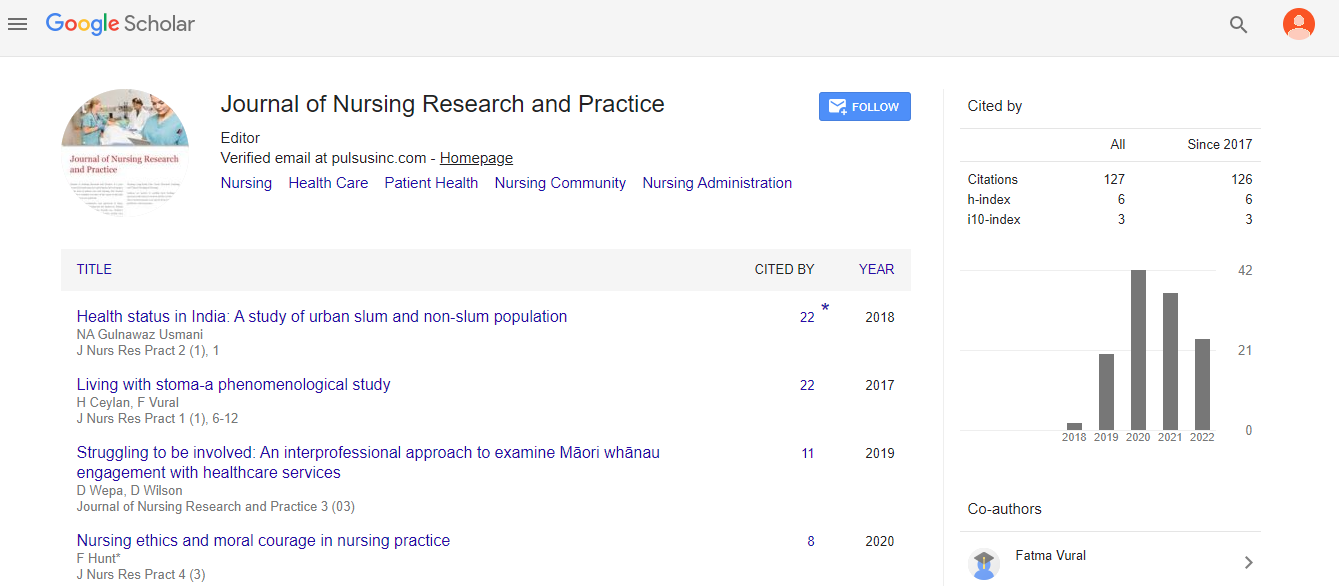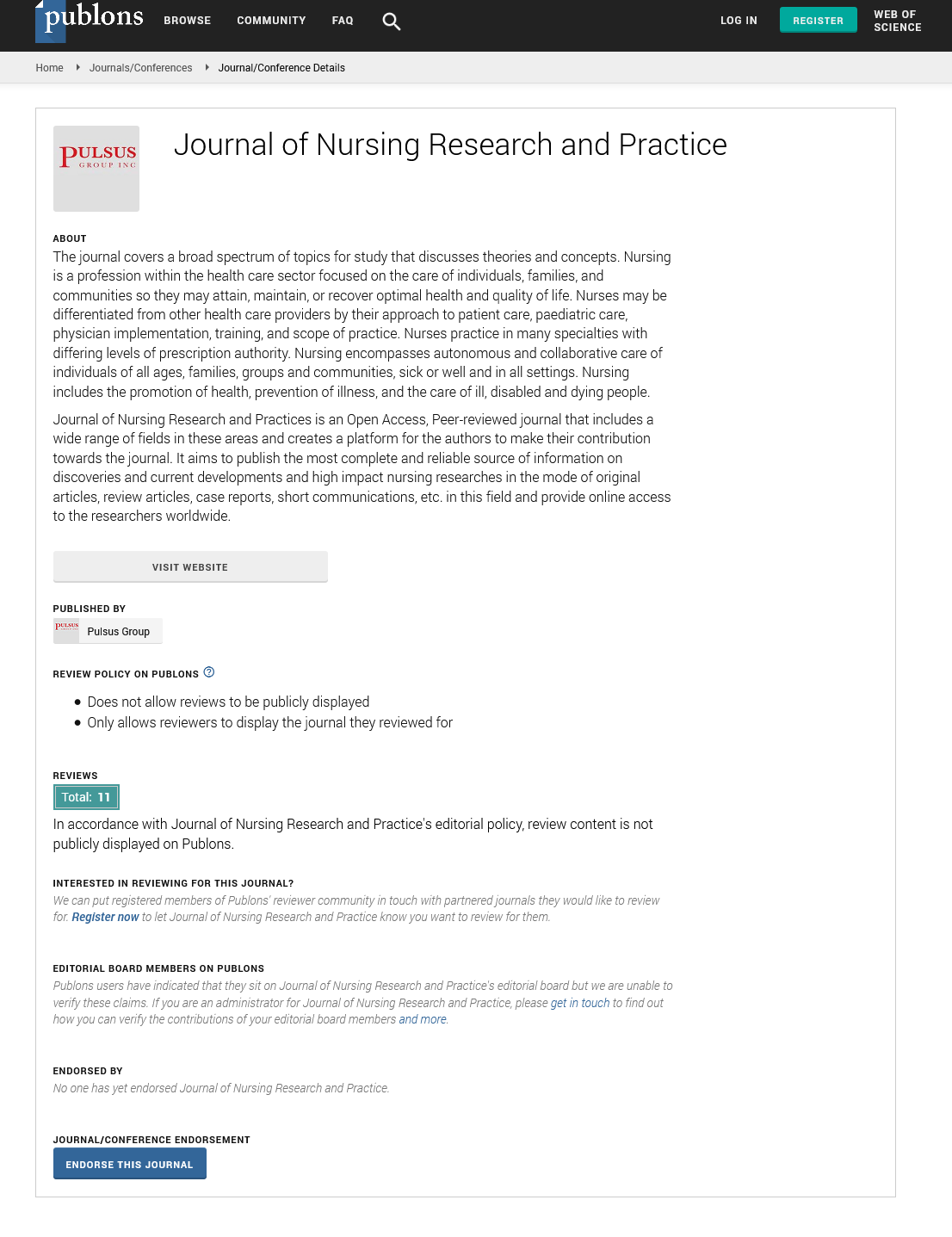Enhancing nursing care quality: Strategies, challenges, and future directions
Received: 07-Feb-2024, Manuscript No. PULJNRP-24-6950; Editor assigned: 09-Feb-2024, Pre QC No. PULJNRP-24-6950 (PQ); Reviewed: 23-Feb-2024 QC No. PULJNRP-24-6950; Revised: 10-Mar-2025, Manuscript No. PULJNRP-24-6950 (R); Published: 17-Mar-2025
Citation: Sayed M. Enhancing nursing care quality: Strategies, challenges, and future directions. J Nurs Res Pract. 2025;9(1):1-2.
This open-access article is distributed under the terms of the Creative Commons Attribution Non-Commercial License (CC BY-NC) (http://creativecommons.org/licenses/by-nc/4.0/), which permits reuse, distribution and reproduction of the article, provided that the original work is properly cited and the reuse is restricted to noncommercial purposes. For commercial reuse, contact reprints@pulsus.com
Abstract
Nursing care quality is a cornerstone of healthcare delivery, ensuring optimal patient outcomes and satisfaction. This article explores the concept of nursing care quality, its significance in healthcare, strategies for enhancing it, challenges faced, and future directions. Through an in-depth analysis, this article aims to provide insights into the critical role nurses play in delivering high-quality care and offer recommendations for continual improvement. Prioritizes evidence-based practices and continually strives for better outcomes for patients. Nursing research stands as a dynamic force propelling healthcare forward, bridging the gap between theory and practice. Its significance lies in its ability to shape evidence-based practices, refine healthcare protocols, and influence policy decisions. The impact of nursing research on patient outcomes is tangible, with advancements in patient safety, treatment efficacy, chronic disease management care. The methodologies employed in nursing research, whether quantitative, qualitative, or mixed-methods, provide a comprehensive framework for exploring the complexities of healthcare. These methodologies are not mutually exclusive; rather, they complement each other, offering a more nuanced understanding of healthcare phenomena.
Keywords
Nursing; Quantitative; Healthcare; Evolution; Patient
Introduction
NUrsing care quality encompasses the delivery of safe, effective, patientcentered, timely, efficient, and equitable care by nursing professionals. It is fundamental to achieving positive patient outcomes, enhancing patient satisfaction, and optimizing healthcare delivery. In recent years, there has been increasing emphasis on improving nursing care quality due to its profound impact on overall healthcare system performance and patient experiences. The direct impact of nursing research on patient outcomes cannot be overstated. Through rigorous investigation and analysis, nurse researchers identify best practices, effective interventions, and strategies for improving patient safety. For example, research studies may focus on reducing hospital-acquired infections, preventing medication errors, or enhancing the management of chronic conditions. The implementation of evidence-based findings directly translates into improved patient outcomes and a higher quality of care. Nursing researchers employ various methodologies to investigate complex healthcare issues. Quantitative research involves the collection and analysis of numerical data, allowing for statistical inferences. This approach is commonly used to assess the effectiveness of interventions and measure patient outcomes. On the other hand, qualitative research involves exploring the experiences, perceptions, and perspectives of individuals, providing valuable insights into the human aspects of healthcare. Combining these methodologies allows nurse researchers to approach research questions from multiple angles, enriching the depth and breadth of their findings. Nursing research faces challenges such as limited funding, time constraints, and the need for interdisciplinary collaboration. However, these challenges also present opportunities for growth and innovation. The integration of technology, collaboration with other healthcare disciplines, and advocacy for increased research funding are avenues through which nursing research can overcome obstacles and continue making meaningful contributions to the field. Nursing research is a dynamic and essential component of healthcare, driving improvements in patient care through evidence-based practices. The impact of nursing research extends beyond the bedside, influencing policy, practice guidelines, and the overall healthcare system. As nurses actively engage in research, they contribute to the continuous evolution of healthcare, ensuring that the profession remains at the forefront of innovation and excellence in patient care. Embracing the challenges and opportunities in nursing research is:
Continuous education and training: Providing nurses with ongoing education and training opportunities ensures they remain updated on the latest evidence-based practices, technologies, and standards of care.
Implementing quality improvement initiatives: Healthcare institutions can establish quality improvement programs focused on identifying areas for improvement, implementing evidence-based interventions, and monitoring outcomes to enhance nursing care quality continually. Enhancing nursepatient communication. Effective communication between nurses and patients fosters trust, facilitates shared decision-making, and ensures patients' preferences and concerns are addressed, thereby improving care quality and patient satisfaction.
Utilizing information technology: Leveraging technology solutions such as Electronic Health Records (EHRs), telemedicine, and decision support systems can streamline nursing workflows, improve documentation accuracy, and enhance care coordination, ultimately leading to better care quality. Promoting interprofessional collaboration. Collaborating with other healthcare professionals, including physicians, pharmacists, and therapists, enables nurses to deliver comprehensive, coordinated care that meets the diverse needs of patients, thus enhancing care quality.
Challenges in achieving nursing care quality: Despite efforts to enhance nursing care quality, several challenges persist, including:
Staffing shortages: Nursing shortages and high patient-to-nurse ratios can strain resources, compromise patient safety, and impede the delivery of highquality care.
Workforce burnout: Excessive workloads, long hours, and emotionally demanding work environments contribute to nurse burnout, which can negatively impact care quality and patient outcomes. Limited access to essential resources, including equipment, supplies, and support staff, can hinder nurses' ability to deliver optimal care. Socioeconomic, cultural, and geographic disparities in access to healthcare services and resources can lead to inequities in care quality and outcomes.
Resistance to change: Resistance to adopting new technologies, processes, or evidence-based practices among nursing staff and healthcare leaders can impede efforts to improve care quality.
Description
To address these challenges and further enhance nursing care quality, several future directions can be explored:
Investment in nursing education and training: Increasing investment in nursing education and training programs to equip nurses with the knowledge, skills, and competencies needed to deliver high-quality care.
Prioritizing nurse well-being: Implementing initiatives to promote nurse well-being, including workload management strategies, mental health support programs, and work-life balance initiatives, to reduce burnout and improve care quality.
Advancing technology integration: Continuously advancing the integration of technology into nursing practice to streamline workflows, improve communication, and enhance patient outcomes.
Addressing healthcare disparities: Implementing policies and interventions aimed at reducing healthcare disparities and promoting health equity to ensure equitable access to high-quality care for all patients. Fostering a Culture of Continuous Improvement: Cultivating a culture of continuous quality improvement within healthcare organizations through leadership support, staff engagement, and data-driven decision-making to drive ongoing enhancements in care quality.
Conclusion
Nursing care quality is paramount for ensuring positive patient outcomes, enhancing patient satisfaction, and optimizing healthcare delivery. By implementing strategies such as continuous education and training, quality improvement initiatives, and leveraging technology, healthcare organizations can enhance nursing care quality and address challenges to improve patient care experiences. Moving forward, investment in nursing education, prioritizing nurse well-being, advancing technology integration, addressing healthcare disparities, and fostering a culture of continuous improvement are essential for further enhancing nursing care quality and shaping the future of healthcare delivery. Nursing care quality is paramount for ensuring positive patient outcomes, enhancing patient satisfaction, and optimizing healthcare delivery. By implementing strategies such as continuous education and training, quality improvement initiatives, and leveraging technology, healthcare organizations can enhance nursing care quality and address challenges to improve patient care experiences. Moving forward, investment in nursing education, prioritizing nurse well-being, advancing technology integration, addressing healthcare disparities, and fostering a culture of continuous improvement are essential for further enhancing nursing care quality and shaping the future of healthcare delivery. Esistance to adopting new technologies, processes, or evidence-based practices among nursing staff and healthcare leaders can impede efforts to improve care quality. Increasing investment in nursing education and training programs to equip nurses with the knowledge, skills, and competencies needed to deliver high-quality care.






